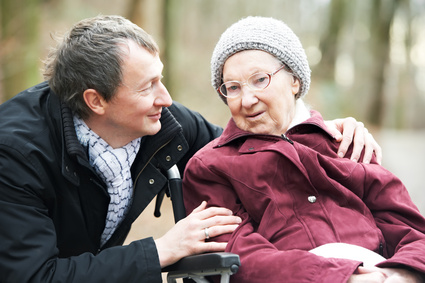How to Avoid the 'Caregiver Burnout'
- Details
- Published on Monday, 11 June 2012 18:41
Caring for an aging parent or loved one is a very challenging task. It requires a lot of time, patience and understanding. Most of the time, caregivers become so busy taking care of others that they tend to forget to take care of themselves. This can result in stress, anxiety, frustration and exhaustion, which may eventually lead to "caregiver burnout."
 Whether you are a family member of the one you are providing care giving to, or are a neighbor or friend, caregiver burnout can occur when a caregiver becomes overwhelmed and tired emotionally, physically and mentally. This makes it more difficult for caregivers to continue care and constantly meet the demands of their elderly loved one.
Whether you are a family member of the one you are providing care giving to, or are a neighbor or friend, caregiver burnout can occur when a caregiver becomes overwhelmed and tired emotionally, physically and mentally. This makes it more difficult for caregivers to continue care and constantly meet the demands of their elderly loved one.
First, how do you detect that you are experiencing caregiver burnout? Here are some signs and symptoms to help you identify burnout:
- Are you having trouble sleeping more than 3 nights in a row?
- Are you suddenly losing or gaining a significant amount of weight?
- Are you feeling hopeless or depressed?
- Are you constantly feeling frustrated? Usually frustration comes from feeling that everything is out of control and you cannot do anything about a situation.
- Are you overreacting to minor things? Do you feel like you are unable to control your patience?
- Are you feeling increased anxiety? Are you unable to relax for any length of time?
- And, lastly are you feeling physically and mentally exhausted? Are you feeling tired the minute you get up in the morning until you go to bed at night? Is it at the point that it is affecting your concentration and ability to think clearly?
If you have answered yes to more than half of these questions, you are most likely experiencing caregiver burnout. Do not be scared – you are not alone. In fact, this is a common situation that happens to most caregivers. The important thing to do right now is find ways to prevent or deal with your situation.
Here are some ways to help to prevent or deal with caregiver burnout:
- Take care of yourself emotionally and physically – be sure to get enough sleep, eat healthy and exercise.
- Make time for yourself – take a day off and do something you really enjoy. Have lunch or watch a movie with a friend.
- Join a support group for caregivers – this will allow you to share your feelings and experiences with other people who are in the same situation.
- Know your limits – ask for help, if necessary. You have to accept the fact that you cannot do everything.
- Research more about your loved ones medical condition – the more you know about the illness, the more effective you will be in providing care.
- Share your feelings with someone you trust instead of bottling them up inside. Also, it's always good to hear things from another perspective, especially from someone who is not in the situation.
Another option is to contact an online caregiving support group in your area. Here is a list of some national groups and organizations that you may contact:
- CAPS – Children of Aging Parents, https://www.caps4caregivers.org/
- Empowering Caregivers, https://www.care-givers.com/
- Family Caregiver Alliance, https://www.caregiver.org/caregiver/jsp/home.jsp
- National Family Caregivers Association, https://www.nfcacares.org/
The moral of this story is to be sure to take care of yourself so you can be a loving and effective Caregiver. As the saying goes, "You cannot love others until you know how to love yourself." The same principle applies to taking care of others as well.
Have you ever experienced the 'caregiver burnout?' If so, what steps did you take to relieve the stress and recoup?

